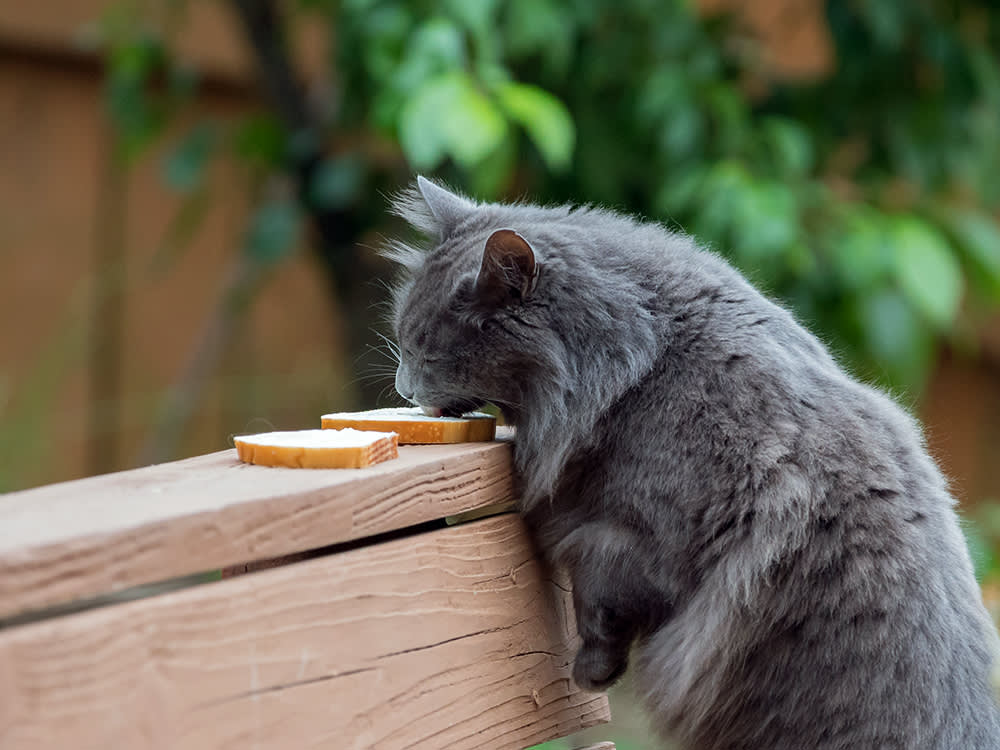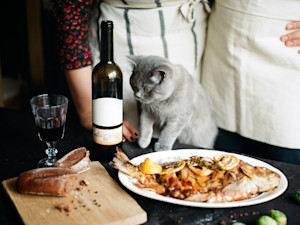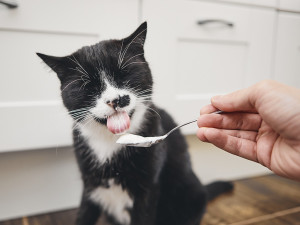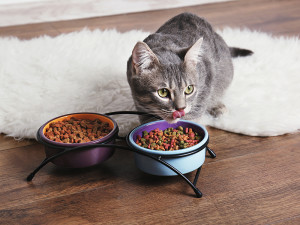Can Cats Eat Bread?
Go ahead and give your carb-loving cat a few bites, but don’t hand over the bread basket.

Share Article
Rest assured, the next time your cat angles for a bite of your tuna sandwich, it’s okay to share a morsel. According to Dr. Autumn Vetter, clinical assistant professor at the University of Georgia Pet Health Center, “Cats shouldn’t have a ton of carbohydrates in their diet, but there are some grains in balanced pet food and small amounts of bread is okay.” Bread is high in carbs, which are harder for cats to digest than proteins, but a few crumbs from the kitchen floor won’t cause your cat any harm.
Is It Safe for Cats to Eat Bread?
The short answer: Yes. Cats can eat a few bites of baked bread but there are reasons to control portions and limit their consumption. While sourdough and focaccia taste great, breads — and other treats with a high carb content — can also cause cats to pack on the pounds, increasing their risk of health issues, ranging from diabetes to arthritis. So, better to go easy on the baked goods.
During digestion, carbs become sugars, which is why Dr. Vetter cautions against offering bread to cats with diabetes. It’s also important to steer clear of specialty breads that have ingredients like garlic, onions, or chives baked in. These ingredients are toxic to cats and can break down their red blood cells, causing anemia. Raisins are also toxic for cats so no matter how good your raisin bread smells to your cat, it’s important not to cut them a slice.
You should also never let your cat eat raw, yeasted bread dough. Dough continues to rise in their gastrointestinal tract and could cause extreme bloating and an obstruction; it also continues fermenting, producing ethanol and carbon dioxide. Your cat may appear disoriented, depressed, and unsteady, as the consumption of raw dough causes your cat to “experience the symptoms of drunkenness,” Dr. Vetter explains. This type of poisoning, which is caused by alcohol intake, can be fatal.

What to Do If Your Cat Eats Bread (or Raw Dough)
It’s not a huge cause for concern if your cat devours a loaf of baked bread. However, you should still watch for signs of stomach upset like vomiting or diarrhea, which should be short-lived. A cat that eats raw, yeasted dough needs to go to the veterinarian right away. Your vet may induce vomiting or pump their stomach to remove the dough, which could be crucial.

Jodi Helmer
Jodi Helmer is a North Carolina-based freelance writer who shares her home with an embarrassing number of rescue dogs and relies on four feral cats to patrol the barn. When she isn’t refilling food and water dishes, Jodi writes about animals for Scientific American, Sierra, WebMD, AKC Family Dog, Living the Country Life, and Out Here.
Related articles
![A dog in the desert modeling in a dog carrier bag.]()
10 Pet Brands Pledging to Save the Planet
A few of our favorite brands participating in Patagonia’s 1% for the Planet global movement — makers of kibble to catnip to carriers.
![Young couple feeding their dog with healthy green food from the farmers market at home]()
8 in-Season Fruits and Veggies That’ll Make a Healthy Treat for Your Dog
Use this as your spring farmers' market shopping list for you and your pub.
![A grey cat looking at a dish of fish]()
The 5 Best Fish Oils for Cats
The next best thing to branzino, omega-3s support your cat’s skin, brain, joint, and heart health.
![A cat licking yogurt from a spoon.]()
6 Best Cat Probiotics
Is your cat’s microbiome out of whack? It may be time to add probiotics to their diet.
![Grey cat at looking up from eating on floor at home]()
Gut Feelings: How to Balance Your Pet’s Microbiome
The mind-gut connection isn’t just for people. Your dog or cat’s gut microbiome plays a big role in their health and well-being.





